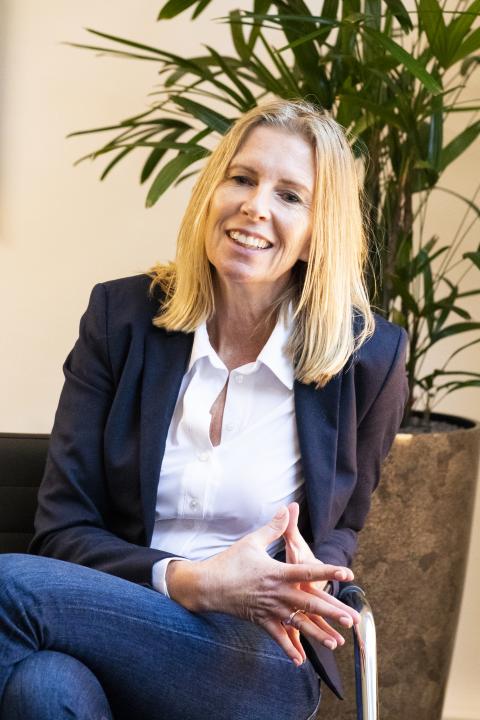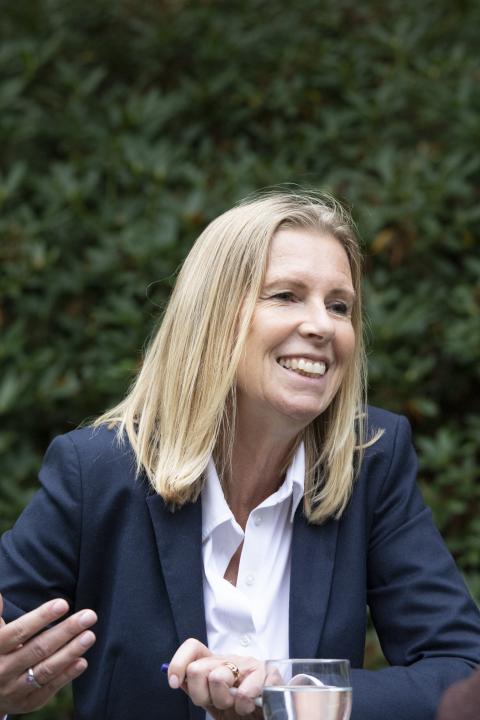Jantine Schuit on talent and the labor market: ‘The old model is circling the drain’
Tilburg University wants to offer more opportunities for personal development than traditional careers in academia. Making optimal use of diverse talents will become central, both in leadership and in rewards. Jantine Schuit: ‘This will need a cultural change.’
In the past, universities used to compete mainly on disciplinary top research, with a high position in the rankings as the be-all and end-all. It is debatable whether such a single-minded focus is wise. Society requires more interdisciplinary collaboration. Moreover, it is doubtful whether a one-sided perspective will help you get the best out of your people and teams and make you attractive as an employer to a broad variety of talented people in the long term. At Tilburg University, Vice-Rector Magnificus Jantine Schuit champions the new vision of talent and the labor market in the university’s 2022-2027 strategy. She is convinced that radical change is needed. “Our attitude in the past ten years has not made us attractive enough as an employer. The current generation has different perspectives. For instance, they want to include the external world and have social impact. And they are looking for an employer where they feel safe, where they can work in a pleasant environment and achieve their full potential.”

Tough choices
In order to remain interesting to a broad variety of talent, the university will have to go through a cultural change, Schuit thinks. In her opinion, it all starts with leadership. A first step has already been taken in this context, with Connected Leading: a leadership program developed in co-creation with colleagues, consisting of tools and projects aimed at leadership and team development. It emphasizes leadership qualities like connection, self-awareness, and dialogue. All lot of attention is paid to personal leadership, as is demonstrated by a module in which approximately 600 colleagues reflected on their strong points.
Unity will be essential in the coming years, in which we as a university will have to make clearer choices than we have done in the past ten years
The 2022-2027 strategy builds on this principle. Schuit would like to see all supervisors at Tilburg University take the Connected Leading program. So far, this program has been embraced with more enthusiasm at some Schools than at others, but she can see the latter ones catching up now. “This is important because we all need to feel more responsibility for the atmosphere in the organization as a whole. Unity will be essential in the coming years, in which we as a university will have to make clearer choices than we have done in the past ten years.” In Schuit’s opinion, the university has had difficulty making choices but is now taking decisive action. A case in point is the decision to become a Social Sciences (including Economics, Management, Law, and Behavioral Sciences), Humanities, and Digital Sciences (SSH-D) university. Another example is the investments in several clearly defined themes, including broad prosperity.
Social safety
The Connected Leading program is working well, but merited expansion. The most important addition to the new strategy is dedicating more attention to the theme of social safety. A safe and positive working environment in which differences are valued is not at all self-evident, as Schuit knows from experience. As a woman in the male-dominated medical world, she has been at the receiving end of misogynistic behavior. “At the time, I thought that must be part of the deal. But in my present position, I feel I really cannot accept this any longer.” She realizes that, in the highly hierarchical academic world, there is always a risk of an unsafe environment. “It is crucial that we are aware of this. Those who cause these situations often do not realize that their behavior creates a socially unsafe environment. It can be about little things, jokes. It is important that we pick up the signals and address each other in the event of transgressive behavior. We also need to be on the alert about colleagues who find it hard to talk about these things.”

Use (y)our talents
Another new aspect in the strategy 2022-2027 is the link of Connected Leading with Recognition & Rewards under the ‘Use (y)our talents’ project. Making optimal use of the diversity of talents is thus central to both leadership and rewards. In line with the national Recognition & Rewards program, there will be a greater emphasis on talents other than research skills.
Research as well as teaching will continue to be the basis in academic careers. But we want to offer more scope for talent, impact, and leadership
Support staff should have more opportunities to build a career as a supervisor, also at a young age. And as to academic staff, the university wants to be open to more career paths than the traditional one of rising through the ranks towards a professorship (usually because of top-level research).
“Research as well as teaching will continue to be the basis in academic careers. But we want to offer more scope for talent, impact, and leadership. The latter two in particular do not have a status similar to top-level research. These career paths do not necessarily move up but can also move sideways, in the sense that, for instance, contributing to an impact initiative is rewarded.” Tilburg University is currently not at the forefront of Recognition & Rewards, but it does have the ambition to be so, Schuit states. “This is borne out, for instance, by our considerable investments in initiatives that enable colleagues to develop in impact or teaching. Examples include the Academic Collaborative Centers and the Tuned-in Network, that supports educational innovation.”
War on talent
With the broad talent development of Use (y)our talents, Tilburg University in fact makes a very clear choice: the university explicitly does not focus on the ‘war on talent’ among the large business schools and top universities. Schuit: “In principle, we are cautious about offering the enormous salaries and privileges demanded by top-level researchers. The money involved cannot be spent on other things. We want to empower people and become more attractive as an employer in that way. I personally think that this is the best way, to distinguish yourself as a university. The old model is circling the drain.”
'Weaving Minds & Characters' Strategy Towards 2027
Stay up-to-date on all strategic developments and activities leading up to our 100th anniversary.
